The Mobile Library, an activator in the community three positions (or claims)
La Gerència de Serveis de Biblioteques, en la línia del Pla d’actuació de mandat 2016-2019, treballa per ampliar i millorar el servei bibliotecari arreu del territori prestant una atenció especial als municipis petits i en connectar la tecnologia amb les persones. Un exemple molt recent d’aquesta voluntat és la inauguració del desè bibliobús de la Xarxa de Biblioteques Municipals que des de setembre d’aquest any ofereix els seus serveis a 12 municipis de la comarca d’Osona, que per la seva reduïda població no disposen de cobertura bibliotecària estable. El bibliobús Puigdon incorpora novetats tecnològiques com una pantalla gegant per a diferents usos, tablets per accedir a continguts digitals, màquina d'autopréstec, o servei de wifi, que representen un canvi de model en el servei de biblioteca mòbil, amb la intenció d’actualitzar del Pla de bibliobusos de la XBM.
Per conceptualitzar l’oferta de serveis del Puigdon vam realitzar un treball de recerca de bones pràctiques que ens servissin d’inspiració, d’entre les que destacava la biblioteca mòbil d’Espoo. Tot i ser d’àmbit urbà i donar servei a una realitat, la finlandesa, molt diferent a la del nostre país, és un molt bon exemple de la necessitat dels bibliobusos de cooperar amb els agents del territori i d’ampliar i reformular els seus serveis tradicionals per tal d’adaptar-los a les diferents necessitats de la comunitat. En aquest article l’Eva Wilenius ens desgrana el secret del seu èxit.
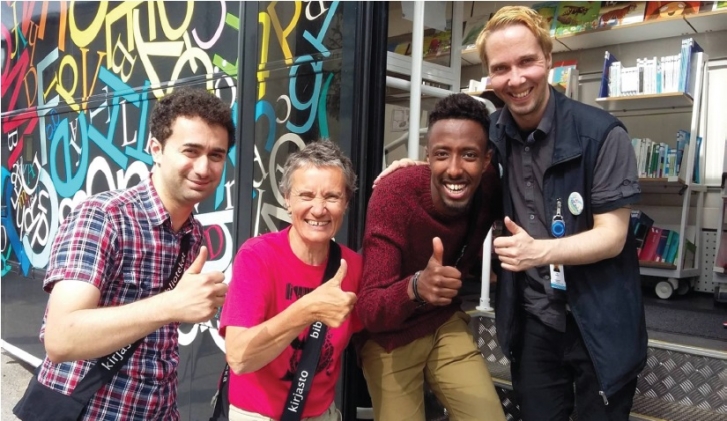
1. Offering additional postal services in an otherwise traditionally operated mobile library is not the salvation
- The mobile libraries in Finland are facing numerous challenges due to the population decline in rural areas and the decline in adult book lending among other things. During the last decade there have been attempts to broaden the services (on a small scale) by trying out collaboration between the libraries and other municipal services such as the health services and the postal services.
- Other solutions investigated are different sizes of buses and cooperation between municipalities.
- Still, these added services (among them blood pressure measuring or pharmacy products for sale in the bus) have not brought the needed boost in customers or an increased appreciation of the mobile library services by municipal authorities. In the last 15 years the amount of mobile libraries in Finland has been dropped from 201 to 140 buses this year.
- The city and municipality of Espoo is situated next to the country´s capital in the south of Finland. It is a city that is growing steadily, with both immigration from within the country and from outside, for example a large amount of asylum seekers and refugees. The context that the mobile library is functioning within is of course very different from a mobile library operating in for example the north of Finland. At the same time I would argue that the operating principles should be the same. And more , these principles should be the same for all the libraries, for local and mobile libraries equally.
- The basis for these operating principles are stated in the Finnish Library act. The goal of the act is to promote among other things the citizen's equal possibilities to civilization and culture, possibilities to lifelong learning, active citizenship and democracy.
- The act also states that library services are free of charge in Finland (a matter that is crucial and has a long tradition). Libraries and their services must be open and free to everyone despite of destitution or poverty.
2. A mobile library that matters: the main focus should be on culture, learning and interaction, the same principles of service that govern the local libraries.
- The values of the Espoo city library – following the principles of the Finnish library act – are very much present in the constant planning and evaluation of new services and the every day work we do at the mobile library.
- Courage – The library is a forerunner, daring to try out new ways, relinquishing some of the old.
- Learning and culture – at the library you learn to understand the world and practice up-to-date civics.
- Social responsibility – The future of Espoo is (growing up) at the library.
What does it take?
- Courageous leaders with library staff that share the same values
- Collaboration with different partners. A flexible organization that finds easy enough ways to work with different kinds of volunteers.
- Focus on the question: what does the community need?
- Order of action: doing, learning, planningm, more doing.
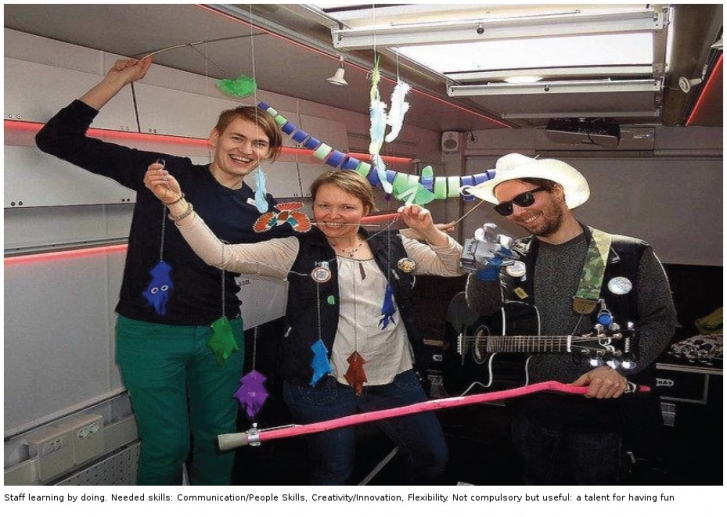
A mobile library that matters: two examples
In addition to regular visits to schools and daycare centers that are not situated within walking distance of a local library the mobile library offers book talk, children´s theatre, music performances and a large variety of different workshops for school classes.
A special emphasis is on children with special needs. Our main goals: to bring new knowledge (technological and pedagogical) to the schools and to give the children experiences of achievement and succeeding.
The mobile library also visits senior homes with a program aimed to stimulate different senses, mental, physical and intellectual.
Staff: the mobile library, staff from other libraries, the youth services, students from occupational and other educational institutions, library trainees, language trainees, partners such as publishing companies, the youth services, senior citizens services
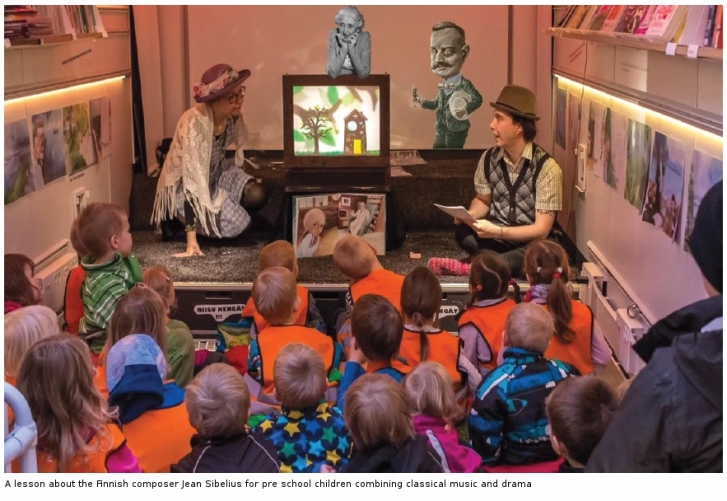
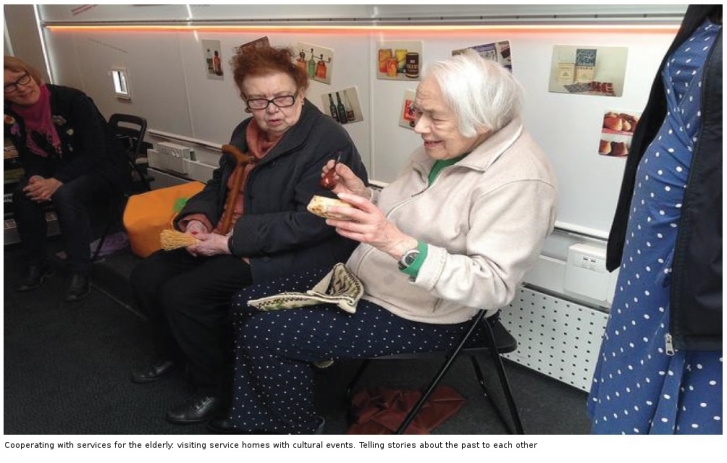
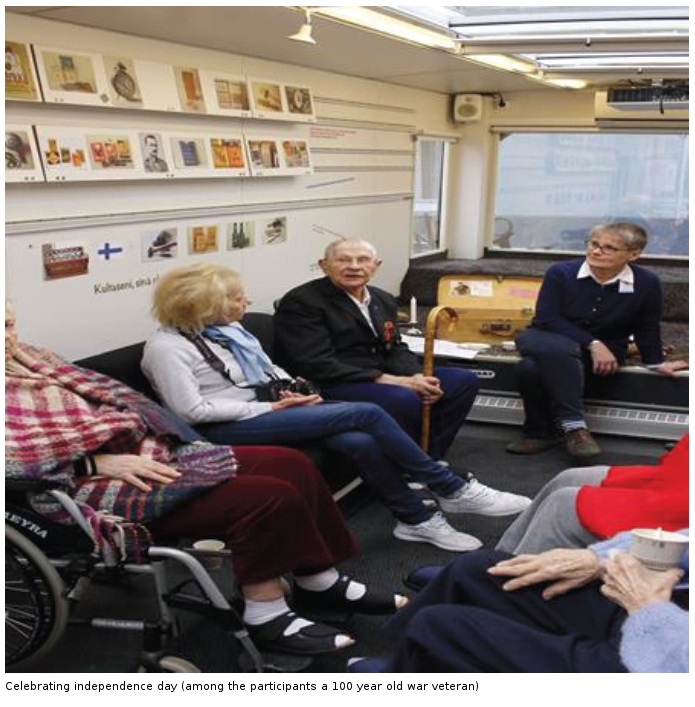
Services for refugees and immigrants
- The x-factor and the mobile library: being able to react fast to the needs of the community.
- The mobile library started visiting the many new asylum centers and the homes for minor asylum seekers in the autumn of 2015. Espoo city library made a fast decision about priorities and the mobile library was able to start the new services with a new collection of material in different languages and together with staff from the other libraries in Espoo.
- Soon there was also had a group of volunteers with us, working as translators and organizing activities, ranging from storytelling in Arabic, Persian, Sorani etc., shadow theatre, music performances to demonstrations of the libraries Makers spaces.
- The main goal is to work towards social stability through integration and the lowering of barriers between the Finnish people and the new comers.
- The library has learned a lot in the process. It has a new growing customer base with whom most of the staff doesn´t have a shared language, and who often doesn´t have much prior experience of library services. The mobile library is also learning new ways to work with volunteers. Since the library is doing this work as an integrated respected institution it lowers the threshold for the public to come and participate.
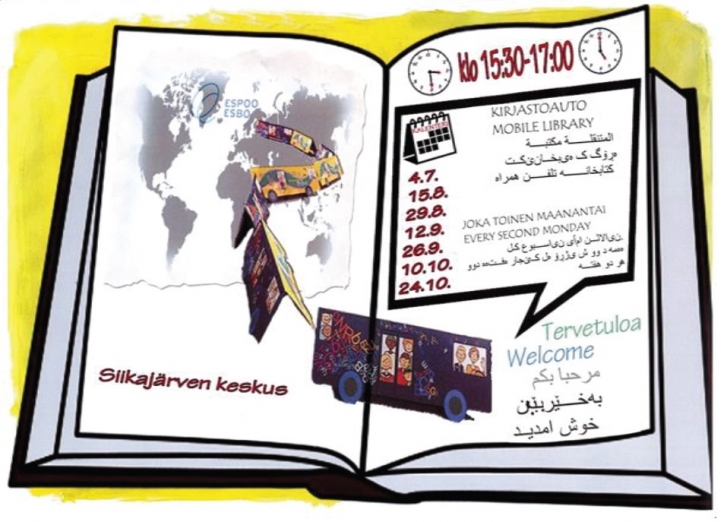
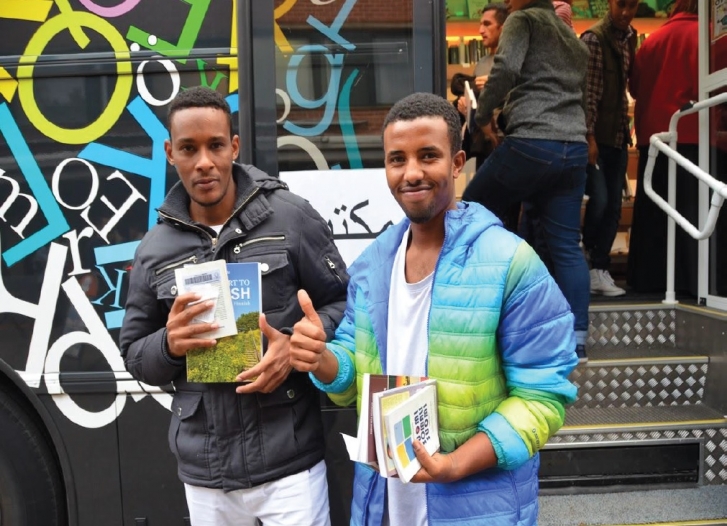
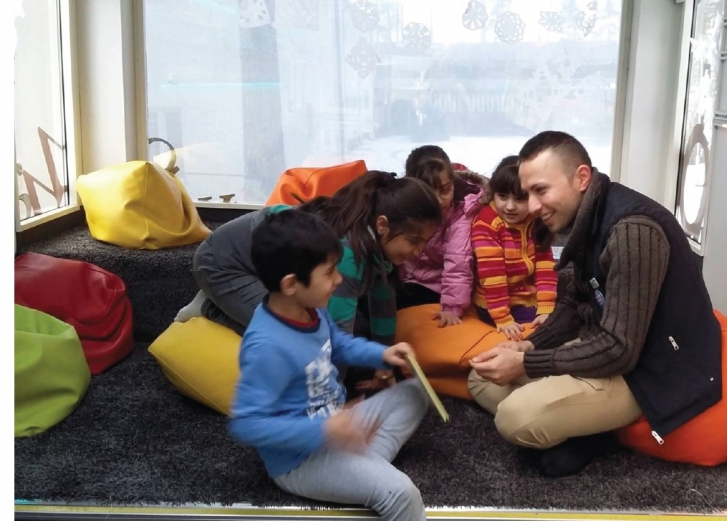
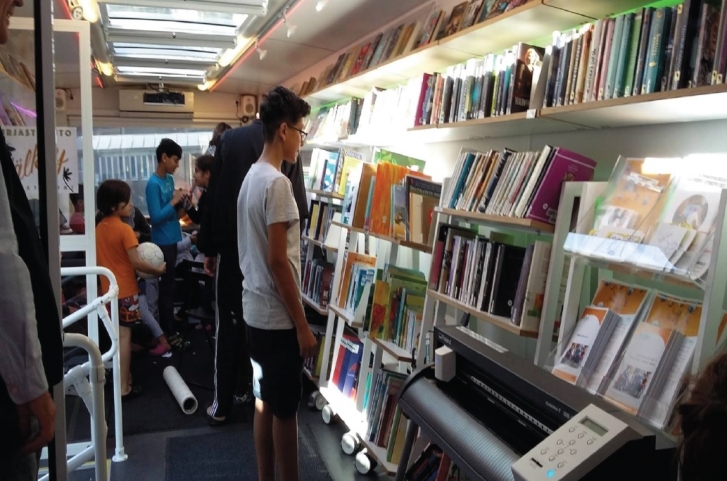
3. Public library funding comes from the public, and the best way to convince the public that their mobile library deserves more funding is to get the public inside the library doors.
- There are many groups of people who benefit greatly by a mobile library, and especially by the mobile library as an activator, also in a city with a very extensive library network such as Espoo. And with the positive effects follows others, beneficial for the municipality and for society at large. The mobile library works as the great equalizer, bringing with it learning, inspiration and culture.
- By attending various festivals, cultural events, community parks, beaches (yes, we have summer in Finland and a “Beach bus”) and so on, combining book lending with samples of the various work shops and other activities we provide for our customers of Espoo, the mobile library is doing the most efficient marketing of all.
- Wherever we go we encounter people who marvel at the services the city is providing its inhabitants, especially the children and the elderly. Other ways of marketing the library are of course important ( getting media coverage etc.) but most important is reaching out to as many people as possible, also the ones who don´t use the local libraries, and give them first hand experiences of the library of today. That is what we are able to do, at the mobile library.
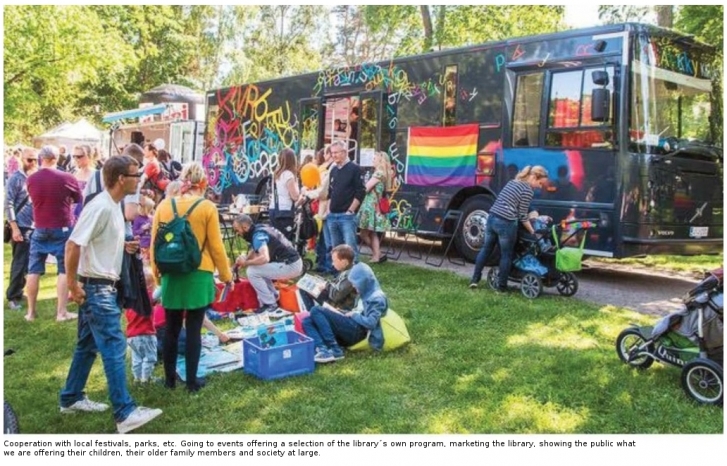
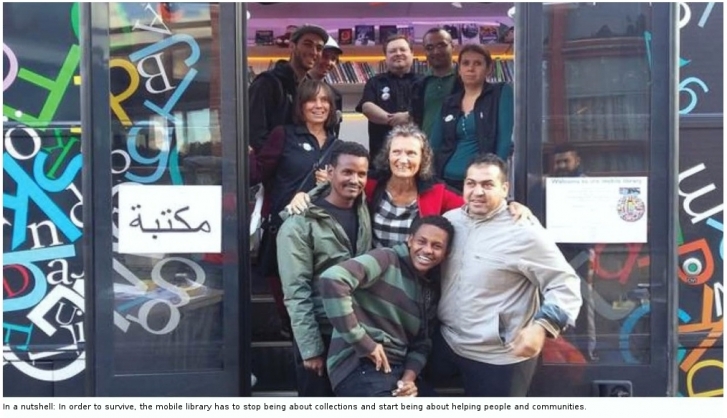
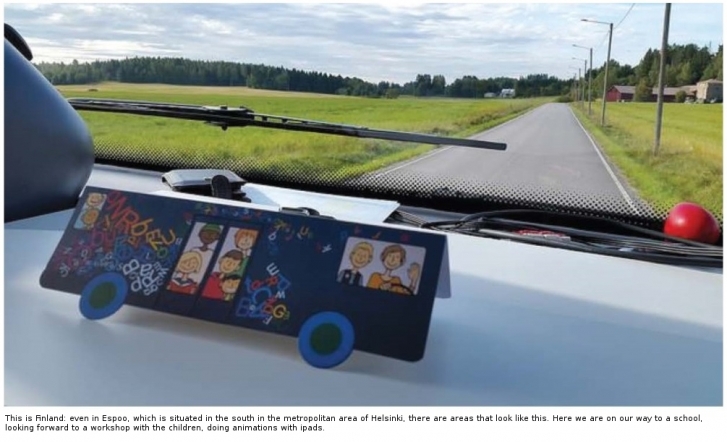
- blog de Eva Wilenius
- 3800 lectures





